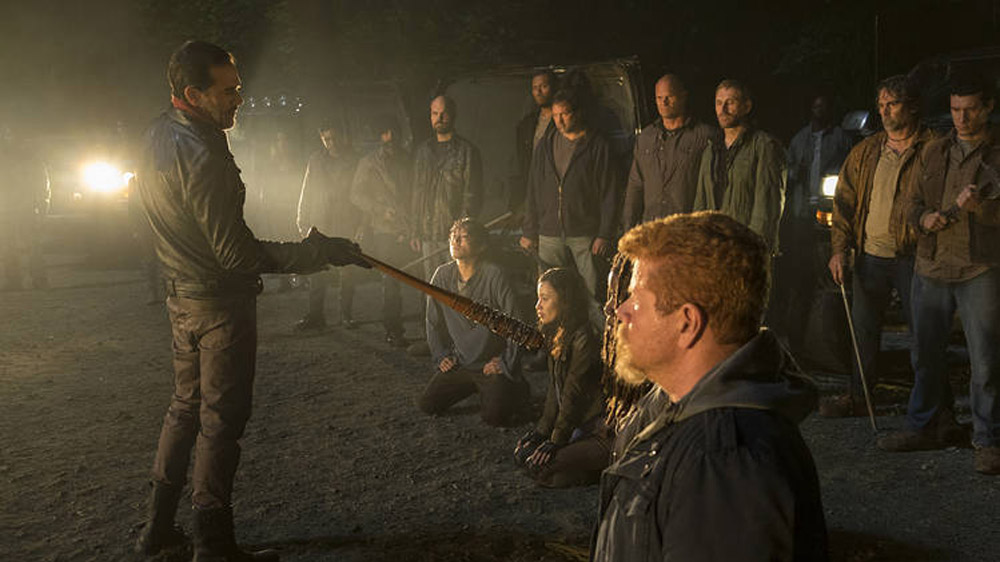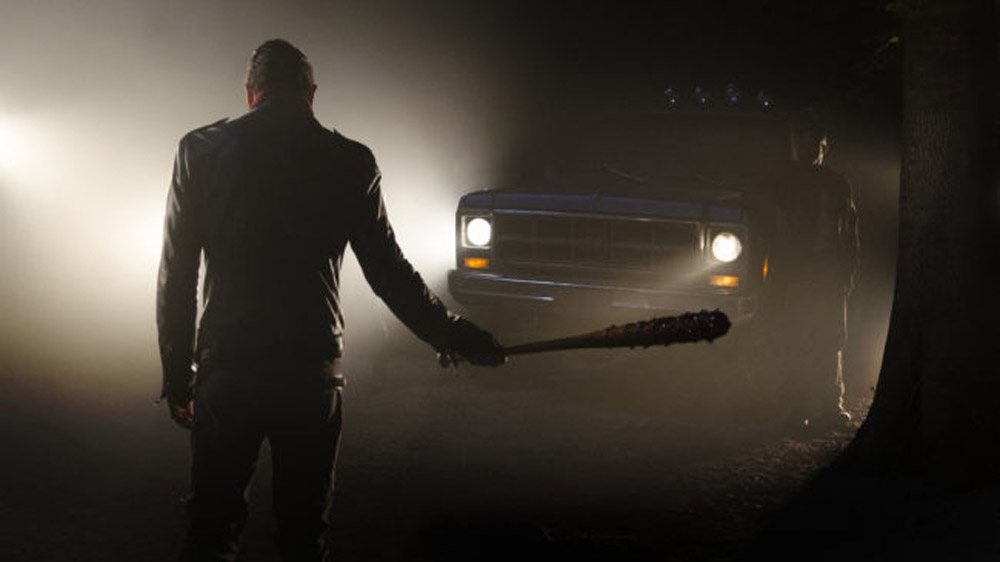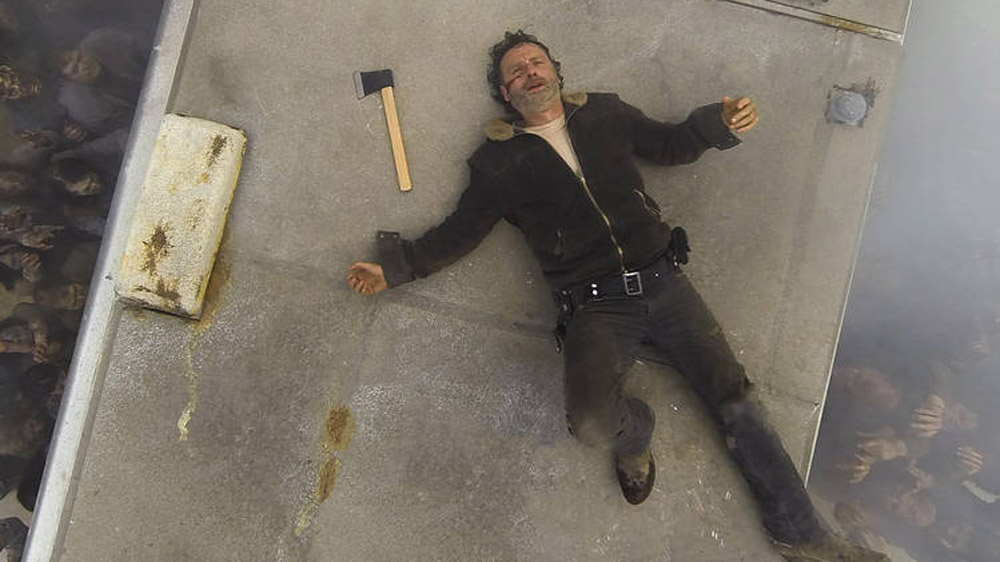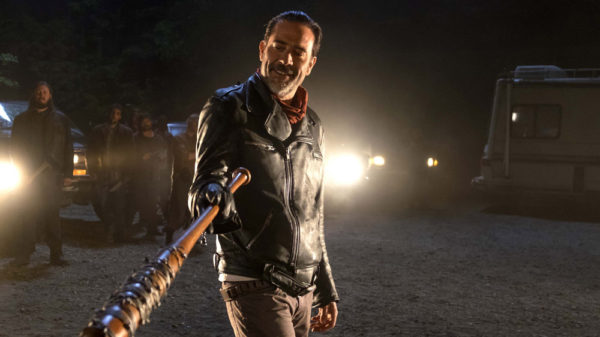After a six-month gap filled with incessant teasing, evasive marketing and mounting expectations, The Walking Dead returned this week to finally batter up and reveal who Negan’s victim was at the end of Season 6.
‘The Day Will Come When You Won’t Be’ didn’t exactly start from a great foundation, coming off the back off that infamous, ill-advised point-of-view cliffhanger, it’s worth clarifying. It’s also true to say that fan expectations were so colossal by this point that the episode just about had to swing for the fences and do something huge in order to justify all the controversy that the finale created.
Unfortunately, there’s only so many justifications you can really give for an episode like this.
Perhaps it wasn’t surprising that a premiere marketed solely off the promise that a beloved character would have their brains bashed in by a baseball bat feels so hollow, so careless in its wall-to-wall brutality. It’s still thoroughly disappointing, though, that ‘The Day Will Come’ offers little more than an uninterrupted descent into the type of nihilism that The Walking Dead, as grim and bleak as it has gotten in its history, has never quite touched.
It’s so utterly unremitting in this grimness and so unwilling to offer the slightest amount of heart or glimmer of hope that, at the end, it all becomes a bit numbing. For an episode that was supposed to shatter me, I reached the end credits feeling apathetic. The Walking Dead ended up playing the shock factor card with such frequency that, increasingly, everything began to feel a bit meaningless.
Chief to the problems that ‘The Day Will Come’ faces are its obnoxious and manipulative structure that chooses to tell this already-thin story in the least satisfying way possible. Before we get to the centrepiece of the episode in the Lucille scene, there’s twelve minutes of flash-forwards to Rick and Negan’s trip in the RV to kill some walkers, filled with small montages of each of the potential Lucille victim’s memories that aim for poignancy but come across as a shallow way to milk the last drops of viewer suspense about a cliffhanger that was misjudged in the first place.
There’s no real reason for this trick – nothing is added narratively by the lack of knowledge about who got killed in that first act, and the sequences could be swapped around without changing the episode’s intent in any way. It makes it clear that The Walking Dead hasn’t learned anything from that huge mistake back in April – it’s still leaning on these cheap tricks that remove bits of key information from the viewers, which really undercuts the idea that this is an episode all focused around shattering, brutal drama.

And then, there’s the Lucille scene itself – something that was conceived of as a horribly fast development in the comics that couldn’t be processed, but is instead dragged out here to the point where the brutality actually feels like a relief when it comes. And as much as I feel frustrated with the tricksy opening act, ‘The Day Will Come’ plays fair with the reveal of the Lucille victim when the time comes, flicking back to Rick’s perspective to definitely reveal that the bat landed on Abraham.
It’s not all that surprising to see Abraham get the bat – he was many fans’ first guess because he lies in the small centre of the Venn diagram between the untouchable fan favourites and expendable supporting cast members; his death is shocking and brutal in the ways the show evidently intends, but it’s not horrific enough to feel alienated entirely. In the short time it’s given to breathe, it’s about as good a death as Abraham could have gotten, allowing him to go down defiantly while saying goodbye to Sasha (with the handsign from last season).
Perhaps this wouldn’t have justified the six-month wait and unbearable teasing on its own, because Abraham, for all his endearing traits, has only been a cast member for a couple of seasons. However, narratively, it made sense, and it delivered on the promise that the show made back in April.
Unfortunately, The Walking Dead had to up the stakes, and kill someone else. It’s hard to tell when the writers decided that two characters would get the bat, but the decision certainly smacks of a need to prove, on a visceral level, that the cliffhanger was worth it, with a resolution brutal enough to justify all the frustration felt.
In of itself, the choice to have two victims is frustratingly shallow and an easy way out of criticism that the resolution wasn’t worth the wait – but it’s the kind of thing that could be justified if the execution were strong enough to merit it. Unfortunately, in this seeming desperation to prove that it could be brutal, ‘The Day Will Come’ overcompensated for the finale’s mistakes.

Lucille victim number two, Glenn, does not get a good death. In fact, it’s the kind of death that encapsulates The Walking Dead’s least admirable instincts. There’s the gore that’s cranked up to unbelievably gratuitous levels – the shot of Glenn with half his skull caved in and his eye hanging out, gurgling helplessly for Maggie was unfortunately tone-deaf in all the wrong ways, aiming for stomach-churning but coming across as almost admiring in how long it revelled in that imagery.
Even worse, coming just a few minutes after Abraham’s death, an event that should feel absolutely momentous (the ‘Atlanta group’ who met up back in season 1 were totally untouchable before this) almost feels like a punchline, an additional touch of cruelty rather than anything meaningful at all. The show has assigned more significance to the deaths of minor supporting characters like Denise.
Those deaths had a specific point to them, at the very least. Glenn’s just serves to reinforce Negan’s platitudes that he’s a ‘man of his word’, something that the rest of his actions throughout the episode make abundantly clear anyway. His death and Abraham’s mix into one, making the same point and aiming for the same kind of visceral horror at Negan’s callous brutality. Glenn’s heightened status leaves Abraham’s death feeling small-fry and less impactful in the longer term, and the fact that Abraham died before Glenn robs Glenn’s death of any individual meaning.
It’s contradictory storytelling, the kind of senselessness that doesn’t make for resonant drama – it just wants to sicken people with an onslaught of violence with no depth behind it.
There are some redeeming aspects to this premiere. Most revolve around the sheer charisma of the premiere’s two lead actors, Andrew Lincoln and Jeffrey Dean Morgan, whose powerhouse performances go some way towards elevating the repetitive material they’re given.
The clear MVP here, much like the finale, is Morgan, who embodies Negan with relish, bringing a darkly humorous enthusiasm to his many monologues that provides a bit of a spark in amidst the grimness. Negan is given some reasonably humdrum dialogue that touches on familiar themes, but Morgan brings so much nuance and commitment to the character that he’s in turns joyful, sardonic and terrifying, with absolutely no pointer as to how his tone and mood will change with any given line of dialogue.
Morgan’s casting is note-perfect, and the chance to see him delve further into this iconic character in the coming weeks provides at least one reason to keep coming back for subsequent episodes.

Equally terrific is Andrew Lincoln, whose performance ‘The Day Will Come’ leans on heavily for its emotional impact before we finally see other characters grieving in the final few minutes.
Lincoln is given the difficult task of trying to communicate Rick’s intense fear and panic with minimal dialogue yet seemingly infinite close-ups, but he easily surmounts that challenge in a performance that’s so committed to portraying the extent of Rick’s broken psyche that you have to wonder how he had to prepare to get into that headspace.
It’s a credit to his performance that one moment of tension in ‘The Day Will Come’ really lands in the moment where Rick is forced to nearly cut Carl’s arm off to save the group. The moment requires Lincoln to essentially go into uncharted territory for his performance, and the visceral portrayal of Rick’s breakdown into a fractured, begging mess gives the scene enough power that, for a moment, it’s really possible to believe that the show will go through with it.
In an episode that showed off the weakest aspects of this show’s scripting, it’s at least encouraging to see the ever-swelling cast at the top of its game.
‘The Day Will Come’ finishes on a montage of grief and stunned horror that should be hugely affecting and powerful, but coming after an episode as one-note in its brutality as this, the final section just feels like a trudge to the end that hammers in the sheer hopelessness of the situation just one bit more.
And even then, it can’t quite follow through with its attempt to track the psychological states of the characters in a realistic way, opting instead for a few shots of a dream sequence where all the characters are alive and happy in Alexandria that’s so manipulative and schmaltzy that it robs any credibility that this episode could work as emotional character drama just for a few minutes.

‘The Day Will Come When You Won’t Be’ aims to be brutal and shattering, and it is that. But in its attempt, it forgets to be anything else, culminating in an hour of television that’s depressing in the wrong ways – an episode that seems impossible to actively enjoy.
Not every show has to be optimistic and fun, and The Walking Dead has never claimed to be either of those things. Yet there has to be something to break up the constant nihilism, because otherwise, what’s the point in caring about any of these characters if they’re all destined to meet horrible ends? Where’s the reason to hope that anything will ever get better?
Based on this premiere, The Walking Dead doesn’t seem to know, or care about those answers.
Aired at 9pm on Monday 24 October 2016 on AMC UK.
Buy the complete Season 1-6 box set on Amazon here.
What did you think of this week’s episode? Let us know below…

